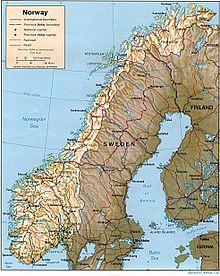Outline of Norway



The following outline provides an overview of, and topical guide to, the Kingdom of Norway.
Norway is a sovereign constitutional monarchy, located principally in the western part of Scandinavia in Northern Europe.[1] The country has land borders with Sweden, Finland, and Russia, while the United Kingdom and the Faroe Islands lie to its west across the North Sea and Denmark to its south across the Skagerrak strait. The country's long and glaciated Atlantic coastline is deeply indented by fjords, rising precipitously to high plateaux.
Norway also includes the Arctic island territories of Svalbard and Jan Mayen. Norwegian sovereignty over Svalbard is based upon the Spitsbergen Treaty, but that treaty does not apply to Jan Mayen. Bouvet Island in the South Atlantic Ocean and Peter I Island and Queen Maud Land in Antarctica are external dependencies, but those three entities do not form part of the kingdom.
Since World War II, Norway has experienced rapid economic growth, and is now amongst the wealthiest countries in the world.[2][3][4] Norway is the world's third largest oil exporter after Russia and Saudi Arabia and the petroleum industry accounts for around a quarter of GDP.[5] It has also rich resources of gas fields, hydropower, fish, forests, and minerals. Norway was the second largest exporter of seafood (in value, after China) in 2006.[6] Other main industries include food processing, shipbuilding, metals, chemicals, mining and pulp and paper products. Norway has a Scandinavian welfare system and the largest capital reserve per capita of any nation.
Norway was ranked highest of all countries in human development from 2001 to 2006, and came second in 2007 (to fellow Nordic country Iceland).[7] It also rated the most peaceful country in the world in a 2007 survey by Global Peace Index.[8] It is a founding member of NATO.
General reference

- Pronunciation:
- Common English country name: Norway
- Official English country name: The Kingdom of Norway
- Common endonym(s): Norge (bokmål), Noreg (nynorsk) or Norga (sami)
- Official endonym(s): Kongeriket Norge (bokmål) or Kongeriket Noreg (nynorsk)
- Adjectival(s): Norwegian
- Demonym(s): Norwegian(s)
- Etymology: Name of Norway
- ISO country codes: NO, NOR, 578
- ISO region codes: See ISO 3166-2:NO
- Internet country code top-level domain: .no
Geography of Norway

- Norway is: a Nordic country
- Location:
- Northern Hemisphere and Eastern Hemisphere
- Eurasia
- Time zone: Central European Time (UTC+01), Central European Summer Time (UTC+02)
- Extreme points of Norway
- High: Galdhøpiggen 2,469 m (8,100 ft)
- Low: Norwegian Sea 0 m
- Land boundaries: 2,542 km
- Population of Norway: 5,002,942
- Area of Norway: 385,252 km²
- Atlas of Norway
Environment of Norway

- Climate of Norway
- Festningen Geotope Protected Area
- Renewable energy in Norway
- Geology of Norway
- Protected areas of Norway
- Wildlife of Norway
Natural geographic features of Norway
- Fjords of Norway
- Glaciers of Norway
- Islands of Norway
- Lakes of Norway
- Mountains of Norway
- Rivers of Norway
- World Heritage Sites in Norway
Regions of Norway
Ecoregions of Norway
Administrative divisions of Norway
Provinces of Norway
Districts of Norway
Municipalities of Norway
- Capital of Norway: Oslo[disambiguation needed]
- Cities of Norway
Demography of Norway
Government and politics of Norway
- Main article: Government of Norway and Politics of Norway
- Form of government:
- Capital of Norway: Oslo[disambiguation needed]
Branches of the government of Norway
Executive branch of the government of Norway
Legislative branch of the government of Norway
Judicial branch of the government of Norway
Foreign relations of Norway
International organization membership
The Kingdom of Norway is a member of:[1]
Law and order in Norway
- Capital punishment in Norway
- Constitution of Norway
- Crime in Norway
- Domestic violence in Norway
- Human rights in Norway
- Law enforcement in Norway
Military of Norway
- Command
- Forces
- Military history of Norway
- Military ranks of Norway
Local government in Norway
History of Norway
Culture of Norway
- Architecture of Norway
- Cuisine of Norway
- Languages of Norway
- Media in Norway
- Museums in Norway
- National symbols of Norway
- People of Norway
- Prostitution in Norway
- Public holidays in Norway
- Religion in Norway
- World Heritage Sites in Norway
Art in Norway
Sports in Norway
Economy and infrastructure of Norway
- Economic rank, by nominal GDP (2007): 23rd (twenty-third)
- Agriculture in Norway
- Banking in Norway
- Communications in Norway
- Companies of Norway
- Currency of Norway: Krone
- ISO 4217: NOK
- Energy in Norway
- Health care in Norway
- Mining in Norway
- Norway Stock Exchange
- Tourism in Norway
- Transport in Norway
- Whaling in Norway
- Water supply and sanitation in Norway
Education in Norway
See also
- Index of Norway-related articles
- List of international rankings
- Member states of the North Atlantic Treaty Organization
- Member states of the United Nations
- Outline of Europe
- Outline of geography
References
- ^ a b "Norway". The World Factbook. United States Central Intelligence Agency. July 2, 2009. Retrieved July 23, 2009.
- ^ List of countries by GDP (nominal) per capita
- ^ List of countries by GDP (PPP) per capita
- ^ List of countries by current account balance
- ^ UPDATE 1-Statistics Norway raises '07 GDP outlook, cuts '08
- ^ FAO Globefish global trends 2006
- ^ Human Development Index. Note that although Norway and Iceland's scores are the same to three decimal places, Iceland ranks higher when the decimal is expanded.
- ^ "Norway rated most peaceful nation". BBC News. May 30, 2007. Retrieved May 20, 2010.
External links
- Norway.no, Norway's official portal.
- Norway.info
- Minifacts about Norway from Statistics Norway
- VisitNorway.com, official travel guide to Norway.
 Norway travel guide from Wikivoyage
Norway travel guide from Wikivoyage- Gymlink.no, a directory of gyms in Norway for visitors and tourists.
- Olive.no, a guide to restaurants in Norway.
- Pictures from Norway
